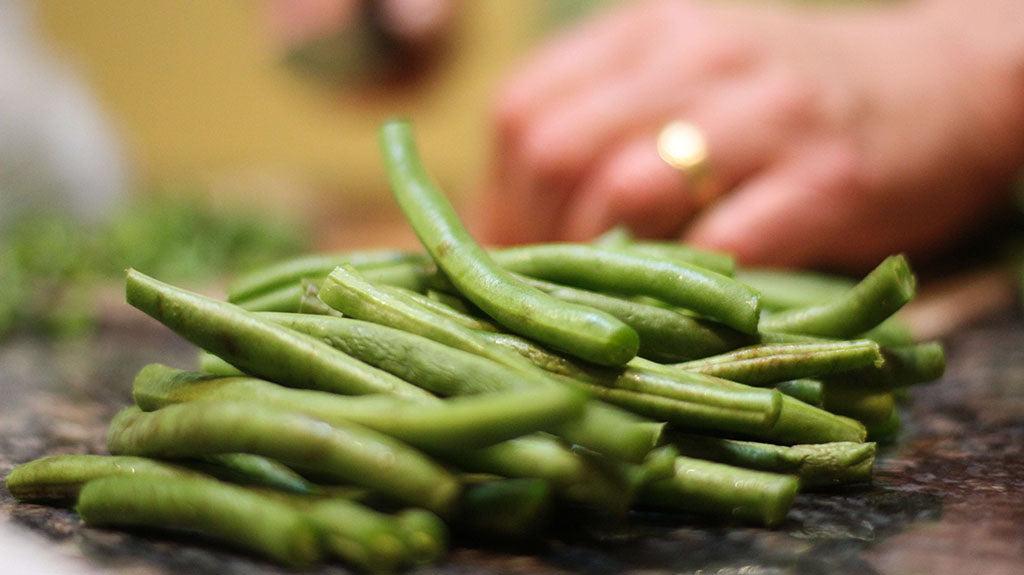Summary: In this blog, we learn whether green beans are good or bad for dogs. Can green beans benefit dogs in a similar way to how they benefit us, or should our four-legged friends avoid them…? Green beans (which belong to the legume family) are rich in nutrients like Vitamin K, B6, iron, calcium, and […]
Are Green Beans Good For Dogs?

Summary: In this blog, we learn whether green beans are good or bad for dogs. Can green beans benefit dogs in a similar way to how they benefit us, or should our four-legged friends avoid them…?
Green beans (which belong to the legume family) are rich in nutrients like Vitamin K, B6, iron, calcium, and antioxidants. They’re also packed with fiber and are low in calories. They also store water, so green beans can be hydrating to consume too. And yes, dogs can enjoy them safely too!
Are Green Beans Good For Dogs?
Yes! Green beans, whether canned, cooked, raw, frozen, boiled, steamed, or grilled are good for a dog to eat, as long as they’re plain. Seasoned or salted green beans are not recommended for dogs, and green beans must definitely not be given to a dog if they’ve shared a cooking vessel with onions or garlic – both can be incredibly toxic to canines.
It’s also advisable to cut up green beans, as feeding large, whole green beans to a dog – particularly smaller breeds – can pose a choking hazard.
Green beans for dogs can boost their fiber levels, which many dogs do need support with. It’s argued that many dogs don’t get enough fiber in their diets. An ideal dog’s diet should contain between 2-5% fiber (but shouldn’t really exceed 10%). If you think your dog could do with a boost of fiber, try sprinkling a small handful of plain, cut-up green beans over their food.
PetLab Co. Pro Tip: Green beans are their most nutritious when served raw, as cooking any vegetable naturally reduces their nutritional value.

Green Bean Diet For Dogs
For overweight dogs, some pet parents swear by the “Green Bean Diet”, which entails slowly decreasing, a few days by a few days, the amount of dog food they have and replacing it with green beans starting with a ratio of 90% dog food, 10% green beans until the dog is being fed 50% dog food and 50% green beans. Then, when the dog is at their desired weight, you slowly increase the food back up and reduce the number of green beans. However, this diet should not be undertaken unless specifically advised by a professional, qualified veterinarian. Otherwise, it may lead to nutritional deficiencies and a dog risks putting the weight they’ve lost rapidly back on again when regular feeding resumes if their lifestyle and their treat allowance haven’t changed too.
You shouldn’t put your dog on any diet unless they have been assessed by a vet. Any unwanted weight gain should always first be addressed by making sure the dog is being appropriately exercised for their size/breed and not being generally overfed in food and treats.
As a starting guide, check out our PetLab Co. on how much exercise a dog requires depending on their breed and size:

Any dog who has gained weight suddenly or isn’t losing weight at all despite dietary changes and appropriate exercise needs to be seen by a veterinary professional to rule out serious medical conditions that could be affecting this, such as Cushing’s disease.
Green Beans For Dogs
Green beans make a fantastic replacement for treats, due to their low-calorie content. A dog’s treat allowance should only ever be 10% of their total food consumption per day to maintain a healthy weight and treats should always be small. As a general rule, a treat should never be bigger than the nail on your first finger. So, cut up your raw green beans, keep them in the fridge, and if your pooch deserves a reward, treat them with a piece of green bean!
However, always take it slowly when introducing any new food to your dog to avoid upsetting their stomach – particularly with puppies. Feed one or two pieces of green bean per day before considering upping the amount you’re allowing them to eat. As with humans, all dogs will react differently to different foods, so always be mindful of this when trying new foods, snacks, and treats regardless of their touted benefits. Most doggies do love green beans though!
If you’re wondering what other foods you shouldn’t give to your dog, check out our PetLab Co. guide below which lists all foods that are known to be toxic to dogs:

Sources
Author Guthrie, Lynn “Can Dogs Eat Green Beans? Yes – In Moderation” Prrs & Wags by Pumpkin, Aug 10. 2021 https://www.pumpkin.care/blog/can-dogs-eat-green-beans
Author Burke, Anna “Can Dogs Have Green Beans?” American Kennel Club, May 24. 2017 https://www.akc.org/expert-advice/nutrition/can-dogs-have-green-beans/
 S
S



